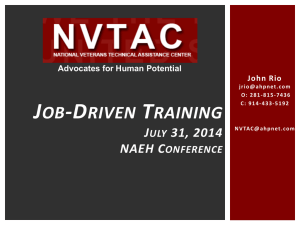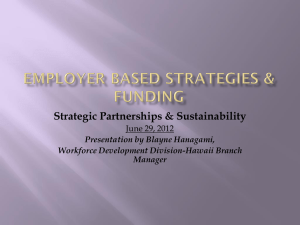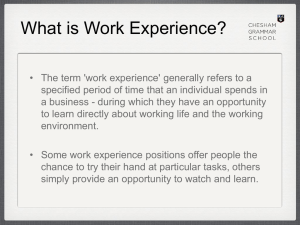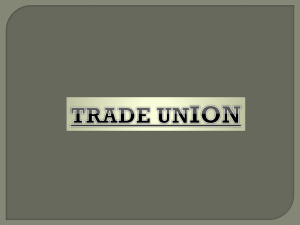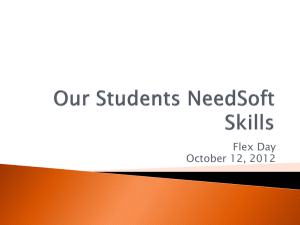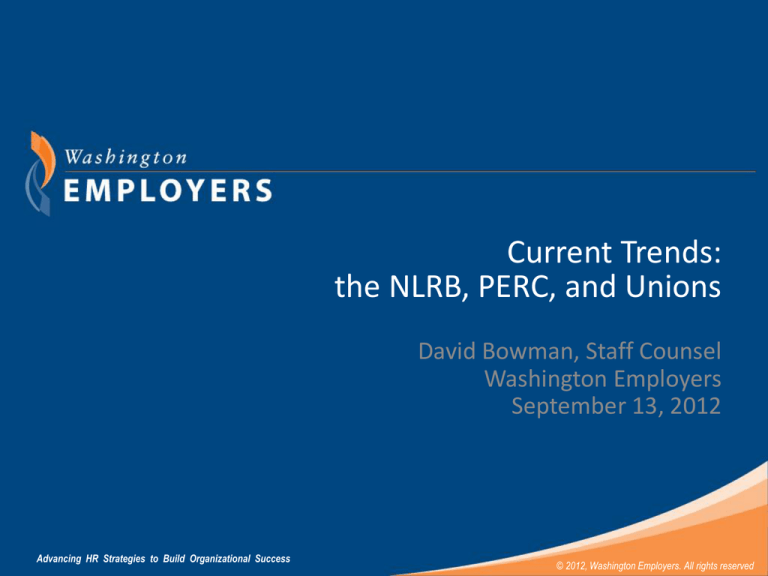
Current Trends:
the NLRB, PERC, and Unions
David Bowman, Staff Counsel
Washington Employers
September 13, 2012
Advancing HR Strategies to Build Organizational Success
© 2009,
2012, Washington Employers. All rights reserved
Agenda
I. NLRB Update
II. Recent PERC Cases of Interest
III. Strategies for Avoiding Unionization
Advancing HR Strategies to Build Organizational Success
© 2009, Washington Employers. All rights reserved
I. NLRB Update
• Social Media: New Oasis for Employee Protected
Concerted Activity
• Micro-Bargaining Units – Not Nearly as Tasty as Micro
Brew
• Still Lurking: The Employee Free Choice Act
• Not So Fast: A Blow to “Quickie” Election Regulations
• Rise and Fall of New Posting Requirements
• Card-Check Rules Eased
• Challenge to President’s NLRB Recess Appointments
Advancing HR Strategies to Build Organizational Success
© 2009, Washington Employers. All rights reserved
Social Media: A New Oasis
Two fronts of NLRB attack:
(1) Employer Policies
(2) Discipline of Employees
Advancing HR Strategies to Build Organizational Success
© 2009, Washington Employers. All rights reserved
Social Media (cont’d)
Policies: The NLRB has rejected employee handbooks and policy
manuals that attempt to prohibit employees from:
•
•
•
•
•
•
making “disparaging” remarks about the company through social media;
identifying themselves, without permission, as employees of the company on
social media;
using social media to engage in communications that could harm the
reputation of the company;
posting “anything that employees would not want their manager or
supervisor to see or that would put their job in jeopardy”;
disclosing, without approval, confidential information about the company on
social media, and
posting on social media discriminatory, defamatory or harassing web entries
about employees, the work environment or work issues.
Advancing HR Strategies to Build Organizational Success
© 2009, Washington Employers. All rights reserved
Social Media (cont’d)
Among the limited policy language specifically upheld by the
NLRB are the following prohibitions:
•
•
•
•
•
Prohibiting the use of social media to post comments about supervisors or co-workers that
were “vulgar, obscene, threatening, intimidating, harassing or a violation of the employer’s
workplace rules against discrimination or harassment,”
Requiring employees to confine their posts to matters unrelated to the company, unless
such posts were necessary to ensure compliance with securities regulations or other laws,
Prohibiting employees from disclosing proprietary information like launch dates, pending
reorganizations, personal health information, and promotional content, and
Requiring employees to post disclaimers that the views expressed in their posts were their
own.
Restricting employee contacts with the media, but only to the extent necessary to ensure a
consistent, controlled company message.
Advancing HR Strategies to Build Organizational Success
© 2009, Washington Employers. All rights reserved
Social Media (cont’d)
Discipline/Discharge of Employees: The following has been held
to be “protected activity” under the National Labor Relations
Act:
•
•
•
Nonprofit social services employees’ Facebook postings about staffing and
allegations of poor job performance previously expressed by one of their
coworkers were “textbook examples” of protected concerted activity even
though discussion occurred on Facebook platform and not on employer
systems
Luxury car sales employee’s Facebook postings that were critical of food and
amenities provided to employees during employer-sponsored sales event,
were part of protected concerted conduct related to complaints about
commissions
Employees’ Facebook postings discussing sports bar’s tax withholding
practices, even if accompanied by comments about one of the owners being
“such an a**hole,” were protected concerted activity
Advancing HR Strategies to Build Organizational Success
© 2009, Washington Employers. All rights reserved
Social Media (cont’d)
The following has been held not to be “protected activity” under
the National Labor Relations Act:
• Reporter’s inappropriate and offensive tweets unrelated to terms and
conditions of employment, and not seeking to involve other employees in
issues related to employment
• Bartender’s Facebook message about employer’s tipping policy, in
response to message from a non-employee
• Emergency response dispatcher’s post on her senator’s ‘wall’ criticizing
employer
• Homeless facility employee’s Facebook comments to her personal friends
(not fellow employees) about mentally disabled clients
• Retail store employee’s profane Facebook postings about her manager
• Preschool teacher’s off-duty obscene and racist rants on social media web
page
Advancing HR Strategies to Build Organizational Success
© 2009, Washington Employers. All rights reserved
“Micro” Bargaining Units
A hugely divisive decision: Specialty Healthcare
and Rehabilitation Center of Mobile, 357 NLRB
No. 83 (2011).
– United Steelworkers sought to organize only certified
nursing assistants at a health care facility, instead of a
broader group of workers.
– NLRB voted 3-1 to permit a union to determine the
composition of the bargaining unit it is seeking to organize
within an employer's workforce. It's the union's call to
decide whether the unit will consist of all or a smaller
group of workers who share a "community of interest."
Advancing HR Strategies to Build Organizational Success
© 2009, Washington Employers. All rights reserved
“Micro” Bargaining Units (cont’d)
Aftermath of Specialty Healthcare:
• “gift of all time for unions”
• not without limits -- “overwhelming
community of interest” standard can
overcome
• Examples:
– violin players → orchestra
– Northrop Grumman Shipbuilding Inc.
Advancing HR Strategies to Build Organizational Success
© 2009, Washington Employers. All rights reserved
Still Lurking:
Employee Free Choice Act
Union supporters view the NLRA as inadequate
protection for workers.
Their solution: Employee Free Choice Act.
– A union that could obtain signed authorization cards from a
majority of workers in a bargaining unit would be certified as
the bargaining agent without lengthy campaigns and secretballot elections – and without the employer’s consent.
• Current law: recognition of a union through signed cards requires a
willing employer; otherwise, election required.
– The bill has languished in Congress. Little prospect of
passage due to current congressional makeup.
Advancing HR Strategies to Build Organizational Success
© 2009, Washington Employers. All rights reserved
Not So Fast: A Blow to “Quickie” Election
Regulations
April 30: “Quickie" election regulations became effective,
cutting average time period from petition until election to
estimated 20 days, about ½ of the 38-day median for 2010 and
2011.
– Less time for employers to make their case of resistance.
May 15: Invalidated by U.S. District Court for District of
Columbia, because NLRB “acted without a quorum”
– Only 2 voted, both in favor. Although only 2 “yes” votes were required, third
member needed to participate, even if just to say “no” or abstain.
May 15: NLRB suspended implementation of regulations.
***Bottom line: Dead, but for how long?***
Advancing HR Strategies to Build Organizational Success
© 2009, Washington Employers. All rights reserved
Rise and (Temporary) Fall of
New Posting Requirements
• Summer 2011: NLRB issues mandate requiring employers to display
11x17 labor rights poster explaining worker's right to form, join or
assist a union, or engage in protected concerted activity.
• "Unprecedented attempt by the board to assert power and
authority it does not possess."
– Jay Timmons, president and chief executive officer of the National Association of
Manufacturers in Washington, D.C.
• April 17, 2012: The U.S. Circuit Court of Appeals for the District of
Columbia temporarily blocked the NLRB from implementing the
mandate. Estimated 6 million businesses, many union-free, spared
from having to allocate space for the notice on their bulletin
boards.
Advancing HR Strategies to Build Organizational Success
© 2009, Washington Employers. All rights reserved
Card-Check Rules Eased
• Under prior law, decertification petitions could begin as soon
as 45 days after employer voluntarily recognized union
following receipt of signed authorization cards from majority
of bargaining unit workers.
• Union advocates argued that having to fight a challenge so
soon was unfair. Allowed “buyers’ remorse,” and prevented
“settling in.”
• Aug. 26, 2011: NLRB rules, in 3-1 vote, that decertification
petitions not permitted for “reasonable period of time after
recognition,” i.e., six months to one year following
recognition.
Advancing HR Strategies to Build Organizational Success
© 2009, Washington Employers. All rights reserved
President’s NLRB Recess Appointments
Legal challenge to legitimacy of President Obama's Jan. 4 recess
appointments of board members is pending.
– The Constitution gives presidents the power to make appointments
when the Senate is in recess.
– Challengers argue that the President’s Jan. 4 appointment of three
members to the National Labor Relations Board, without Senate
confirmation, was outside the President’s authority under the
Constitution, because Senate was not “in recess”.
– If challenge is successful, the Board will be deemed to have lacked
quorum to transact business or enforce regulations for this entire year.
More to come!
Advancing HR Strategies to Build Organizational Success
© 2009, Washington Employers. All rights reserved
II. Recent Decisions from PERC – 2012
City of Tacoma, Decision 11097-A (PECB, Aug.
24, 2012). Employer unlawfully refused to
bargain when it unilaterally declared that
employees who participated in an annual charity
basketball game would no longer be able to do
so while on duty and be compensated for it.
Adverse union: Tacoma Police Union Local No. 6.
Advancing HR Strategies to Build Organizational Success
© 2009, Washington Employers. All rights reserved
Recent Decisions from PERC (cont’d)
Central Washington University, Decision 10967-A (PECB, August
4, 2012). CWU altered the status quo and interfered with
employee rights in violation of RCW 41.56.140(1) when it
decided and announced in May 2010, in the middle of
representation election, that it would reduce work hours of
certain employees in the petitioned-for unit.
Silver lining: Employees were not entitled to back pay, because there was no
actual change in employee work hours during the pendency of the representation
petition.
Adverse union: Public School Employees of Washington.
Advancing HR Strategies to Build Organizational Success
© 2009, Washington Employers. All rights reserved
Recent Decisions from PERC (cont’d)
City of Kirkland, Decision 10883-A (PECB, April 13, 2012).
Upheld: City’s decision to go out of the dispatch business and lay
off dispatchers. Union contended that the City breached the
collective bargaining agreement by contracting out bargaining
unit work. Commission held that the employer’s decision was an
entrepreneurial decision to stop providing dispatch services, and
that the layoff of bargaining unit employees was a result of the
decision to close its operations and not a result of contracting
out bargaining unit work.
Adverse union: Kirkland Police Officers’ Guild.
Advancing HR Strategies to Build Organizational Success
© 2009, Washington Employers. All rights reserved
Recent Decisions from PERC (cont’d)
University of Washington, Decision 11075-A (PSRA, March 14,
2012). University unlawfully removed work from bargaining unit
following its decision to consolidate call center operations.
Although university was not obligated to bargain the decision to
consolidate its call center operations, university was obligated to
bargain the decision to transfer work out of the bargaining unit
and effects of the decision to transfer that work out of the
bargaining unit.
Adverse union: Washington Federation of State Employees.
Advancing HR Strategies to Build Organizational Success
© 2009, Washington Employers. All rights reserved
III. Strategies for Avoiding Unionization
•
•
•
•
Why employees seek union help
How employers can prevent organizing effort
Refresher: National Labor Relations Act
Important “TIPS” for unionization avoidance
Advancing HR Strategies to Build Organizational Success
© 2009, Washington Employers. All rights reserved
Why Employees Seek Union Help
•
•
•
•
Poor Communication
Poor Supervision
Unfair Wages
Change
–
–
–
–
–
–
New ownership
New management
New pay plan, e.g., going to/from incentive based pay
Recent layoffs
Rumors of upcoming change, e.g., facility closure
Reduction or elimination of benefits.
Advancing HR Strategies to Build Organizational Success
© 2009, Washington Employers. All rights reserved
Preventing an Organizing Effort
• Develop Fair and Consistent Employment
Policies
• Have Effective Communications and a
Problem-Solving (Grievance) Procedure
• Treat Employees with Dignity
• Train Supervisors
• Combat Rumors
Advancing HR Strategies to Build Organizational Success
© 2009, Washington Employers. All rights reserved
National Labor Relations Act
(Quick Refresher)
Section 7—Employees shall have the right to self-organization, to form, join,
or assist labor organizations, to bargain collectively through representatives
of their own choosing, and to engage in other concerted activities for the
purpose of collective bargaining or other mutual aid or protection, and shall
also have the right to refrain from any or all of such activities….
Section 8(a)—EMPLOYER UNFAIR LABOR PRACTICES. (a) It shall be an unfair
labor practice for an employer—
Section 8(a)(1)—INTERFERENCE, RESTRAINT, COERCION. (1) To interfere
with, restrain, or coerce employees in the exercise of the rights guaranteed in
Section 7.
Section 8(a)(3)—DISCRIMINATION. (3) To discriminate in regard to hire
or tenure of employment or any term or condition of employment to
encourage or discourage membership in any labor organization.
Advancing HR Strategies to Build Organizational Success
© 2009, Washington Employers. All rights reserved
TIPS for Unionization Avoidance
Supervisors, and their employers, can avoid many problems is they
understand these TIPS: It is unlawful for a supervisor to engage in Threats,
Interrogation, unlawful Promises and Surveillance.
•
•
•
•
Do not threaten
Do not interrogate
Do not make promises
Do not engage in surveillance
Advancing HR Strategies to Build Organizational Success
© 2009, Washington Employers. All rights reserved
Threats
Words or actions that:
• discourage employees from supporting a union
• interfere with an employee’s free choice.
Examples: threats that the facility will close down
because of the union, that employees will lose their
benefits, or that employees who support the union will
be fired or demoted.
Advancing HR Strategies to Build Organizational Success
© 2009, Washington Employers. All rights reserved
Interrogation
Management (i.e., any executive, manager, or
supervisor) cannot ask employees about:
– their union activities or interests
– their approval or disapproval of a union
– who else among the employees supports or disapproves of
the union
– who attends union meetings
– any other question aimed at determining an individual’s or
group’s union sentiments.
Management can, however, listen to unsolicited
employee concerns about their union.
Advancing HR Strategies to Build Organizational Success
© 2009, Washington Employers. All rights reserved
Promises
Any promises that are made to have the effect of diffusing union
support would violate the Act.
• Promises of benefit to undermine support for a union?
Illegal.
• Promises to improve wages, benefits or working conditions if
the employees remove the union? Illegal.
• Promises to “keep things as they are” if the employees
remove the union? Probably OK, but dangerously close to
the line.
Advancing HR Strategies to Build Organizational Success
© 2009, Washington Employers. All rights reserved
Surveillance
It is unlawful for anyone in management to observe or spy on
employees who may be engaging in union activities. This
includes:
• listening in on employee conversations regarding union activities
(meetings, picketing, etc.)
• observing who attends union activities
• photographing or videotaping who attends union activities
• electronic (email) monitoring or in any other way trying to determine
whom the union activists may be
Management may, however, listen to an employee who
volunteers any of the above information without prompting.
Management may also follow ordinary security protocol not
directed at union activity.
Advancing HR Strategies to Build Organizational Success
© 2009, Washington Employers. All rights reserved
Employer Action Required!
1. Evaluate current state of employee relations
2. Take steps to:
a. Improve policies
b. Train supervisors
c. Combat rumors
3. Questions? Consult with HR and Legal
Professionals.
Advancing HR Strategies to Build Organizational Success
© 2009, Washington Employers. All rights reserved
Thank you!
Advancing HR Strategies to Build Organizational Success
© 2009,
2011, Washington Employers. All rights reserved


